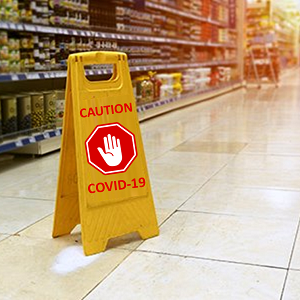Understanding that COVID-19 can be contracted at work, Canada’s provincial and territorial workers’ compensation Boards and Commissions have published information for those who may be eligible to receive benefits after filing a claim.
Note: For more COVID-19 Information & Updates, visit here.
Here is a summary of the COVID-19 Claims Adjudication information provided by Members of AWCBC across Canada:
| Board/Commission | Coronavirus Disease (COVID-19) Claims Adjudication Information |
|---|---|
| WorkplaceNL | Newfoundland and Labrador COVID-19 are adjudicated under work-related injury and illness. More from WorkplaceNL here. |
| WCB PEI | WCB PEI will adjudicate COVID-19 claims if a worker may have contracted the virus as a result of work. To have a claim accepted these conditions must be met: there is medical confirmation that the worker has COVID-19; the worker has been exposed to COVID-19 at work; and, the exposure is confirmed to be work-related, that is, it arose out of and in the course of their employment. More from WCB PEI here. |
| WCB Nova Scotia | WCB Nova Scotia are adjudicating claims related to COVID-19 on a case-by-case basis. As set out in the Nova Scotia Workers’ Compensation Act, compensation is only available for a work-related injury or illness. It is not provided for workers who cannot work for prevention, or precautionary reasons such as a quarantine situation. More from WCB NS here. |
| WorkSafeNB | Claims submitted to WorkSafeNB for a COVID-19 virus infection contracted through a work-related exposure are adjudicated on a case-by-case basis. For a claim to be accepted, evidence must show that the infection arose out of and in the course of employment and the risk of contracting the disease through the employment is greater than the risk associated with contracting it through day-to-day living. Compensation is not provided for workers who withdraw from work for prevention reasons. More from WorkSafeNB here. |
| CNESST (Quebec) | CNESST will adjudicate claims from workers who become infected with COVID-19 during the course of their employment. A claimant may be entitled to the usual benefits and services provided under Quebec's Act Respecting Industrial Accidents and Occupational Diseases. More from CNESST here. |
| WSIB (Ontario) | WSIB will adjudicate COVID-19 claims on a case-by-case basis, taking into consideration the facts and circumstances. Adjudicative approach document, here More from WSIB here. |
| WCB Manitoba | WCB Manitoba adjudicated work-related injuries and illnesses, including in some cases COVID-19, are determined on a case-by-case basis. More from WCB Manitoba here. |
| Saskatchewan WCB | Saskatchewan WCB will adjudicate claims from a worker if there is a confirmed link between the worker's exposure and their employment related to contracting COVID-19. Based on Saskatchewan WCB's Injuries – Communicable Disease policy, the following conditions must be met for a COVID-19 claim: there is confirmed exposure to the disease in the workplace; the time period that the illness is contracted is in close proximity to the confirmed workplace exposure; and, the nature of employment creates a greater risk of exposure for the worker than to the general population. More from Saskatchewan WCB here. |
| WCB Alberta | WCB Alberta adjudicated claims, when a worker contracts COVID-19 as a direct result of the duties of their employment, are entitled to compensation if: - the nature of employment involves sufficient exposure to the source of infection; - the nature of employment is shown to be the cause of the condition; and - the nature of employment creates a greater risk of exposure for the worker. In every case, WCB-Alberta adjudicates work-relatedness and benefit entitlement based on the specific and unique circumstances of each case. More from WCB Alberta: For Employers | For workers. |
| WorkSafeBC | WorkSafeBC COVID-19 WorkSafeBC COVID-19 claims for the disease contracted through a work-related exposure are adjudicated on a case-by-case basis. Claimants are entitled to. Claimants are entitled to compensation if evidence that the worker has contracted COVID-19, either: - a medical diagnosis in a medical report, or non-medical factual evidence where other evidence establishes the existence of COVID-19; and, - the nature of the worker’s employment created a risk of contracting the disease significantly greater than the ordinary exposure risk of the public at large. More from WorkSafeBC here. |
| WSCB - Yukon | WCSB - Yukon (formerly YWCHSB) will adjudicate COVID-19 claims for workers who contract COVID-19 as a direct result of their employment. Many Yukoners are working at home following the advice of the Chief Medical Officer and the Government of Yukon. Working at home can make it difficult to separate what would constitute a work-related injury and what would not. A key determining factor in identifying a work-related injury is whether or not the activity a worker was engaged in when injured was work-related. In every case, WCSB - Yukon adjudicates work-relatedness and benefit entitlement based on the specific and unique circumstances of each case. They are entitled to compensation if: - there is a causal connection between the conditions of the work required to be performed and the resulting injury; and, - the injury is linked to a worker’s employment in terms of time, place, and activity consistent with the obligations and expectations of that employment. More from WCSB - Yukon here. |
| WSCC (NWT & NU) | Northwest Territories COVID-19 claims are adjudicated as part of cases of communicable diseases which are a result of daily activities and interactions with people. More from WSCC (NWT & NU) here. |
Disclaimer:
**This table has been designed for general information purposes only. The AWCBC makes no representations as to the completeness or accuracy of the information (which is not exhaustive) and individual workers’ compensation boards/commissions should be contacted for specific or additional information and clarification. See AWCBC’s website for links to Boards/Commissions.
Source: Association of Workers’ Compensation Boards of Canada



